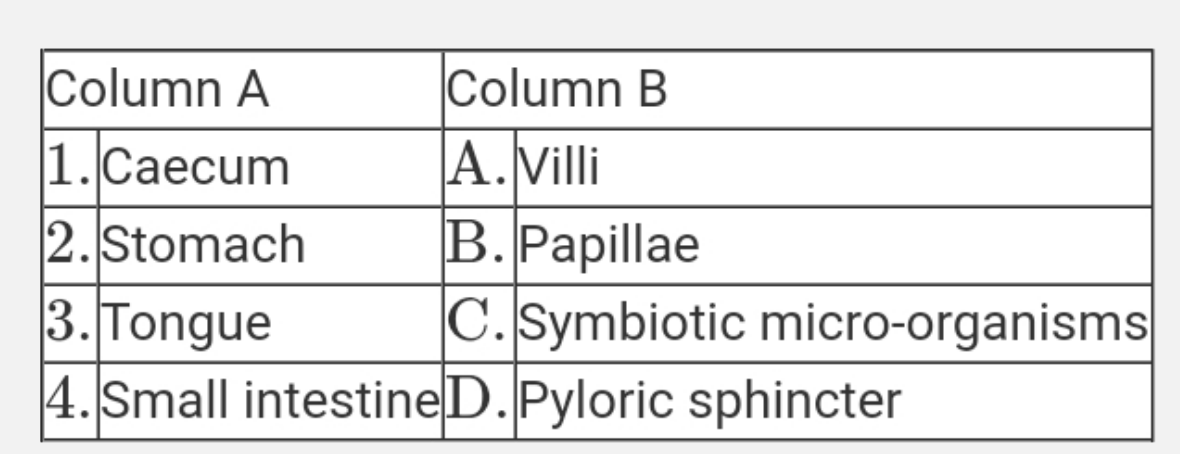Match the column:
ColumnIColumnIIPbS→PbO(p)Roasting
ColumnIColumnIICaCO3→CaO(q)Calcination
ColumnIColumnIIZnS→Zn(r)Carbon reduction
ColumnIColumnIICu2S→Cu(s)Self reduction
The correct Answer is:A, B, C, D
To solve the matching question related to the conversion processes in metallurgy, we will analyze each part of the question step by step.
1. Identify the Processes for PbS to PbO:
- The conversion of lead sulfide (PbS) to lead oxide (PbO) occurs through a reaction with oxygen.
- The balanced reaction is:
2PbS+3O2→2PbO+2SO2
- This process is known as roasting, which involves converting a sulfide ore to its corresponding oxide in the presence of air.
Match: A → P (Roasting)
2. Identify the Processes for CaCO3 to CaO:
- The conversion of calcium carbonate (CaCO3) to calcium oxide (CaO) occurs through heating, resulting in the release of carbon dioxide (CO2).
- The balanced reaction is:
CaCO3→CaO+CO2
- This process is known as calcination, which involves the thermal decomposition of carbonate ores in the absence of air.
Match: B → Q (Calcination)
3. Identify the Processes for ZnS to Zn:
- The conversion of zinc sulfide (ZnS) to zinc (Zn) involves two steps:
1. Roasting ZnS to form zinc oxide (ZnO):
2ZnS+3O2→2ZnO+2SO2
2. Reducing ZnO to Zn using carbon:
ZnO+C→Zn+CO
- The first step is roasting, and the second step is carbon reduction (smelting).
Match: C → R (Roasting and Carbon Reduction)
4. Identify the Processes for Cu2S to Cu:
- The conversion of copper(I) sulfide (Cu2S) to copper (Cu) also involves two steps:
1. Roasting Cu2S to form copper(I) oxide (Cu2O):
2Cu2S+3O2→2Cu2O+2SO2
2. The remaining unreacted Cu2S can react with Cu2O to produce copper:
Cu2S+2Cu2O→6Cu+SO2
- The first step is roasting, and the second step involves self-reduction.
Match: D → S (Roasting and Self-Reduction)
Final Matching:
- A → P (Roasting)
- B → Q (Calcination)
- C → R (Roasting and Carbon Reduction)
- D → S (Roasting and Self-Reduction)
- The conversion of lead sulfide (PbS) to lead oxide (PbO) occurs through a reaction with oxygen.
- The balanced reaction is:
2PbS+3O2→2PbO+2SO2
- This process is known as roasting, which involves converting a sulfide ore to its corresponding oxide in the presence of air.
- The conversion of calcium carbonate (CaCO3) to calcium oxide (CaO) occurs through heating, resulting in the release of carbon dioxide (CO2).
- The balanced reaction is:
CaCO3→CaO+CO2
- This process is known as calcination, which involves the thermal decomposition of carbonate ores in the absence of air.
- The conversion of zinc sulfide (ZnS) to zinc (Zn) involves two steps:
1. Roasting ZnS to form zinc oxide (ZnO):
2ZnS+3O2→2ZnO+2SO2
2. Reducing ZnO to Zn using carbon:
ZnO+C→Zn+CO
- The first step is roasting, and the second step is carbon reduction (smelting).
- The conversion of copper(I) sulfide (Cu2S) to copper (Cu) also involves two steps:
1. Roasting Cu2S to form copper(I) oxide (Cu2O):
2Cu2S+3O2→2Cu2O+2SO2
2. The remaining unreacted Cu2S can react with Cu2O to produce copper:
Cu2S+2Cu2O→6Cu+SO2
- The first step is roasting, and the second step involves self-reduction.
- A → P (Roasting)
- B → Q (Calcination)
- C → R (Roasting and Carbon Reduction)
- D → S (Roasting and Self-Reduction)

